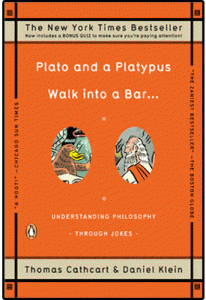 A few years ago, a good friend of mine gave me a copy of a little book, Plato and a Platypus Walk into a Bar, an introduction to philosophical ideas using jokes as a means to make the ideas come to life for the reader. Now, I’ve never considered philosophy to be a particularly amusing subject–in fact, it’s quite the opposite, an exceptionally serious subject. So it’s not surprising that Plato and a Playtpus, written by Thomas Cathcart and Daniel Klein, is a serious book, in spite of the somewhat lighthearted approach.
A few years ago, a good friend of mine gave me a copy of a little book, Plato and a Platypus Walk into a Bar, an introduction to philosophical ideas using jokes as a means to make the ideas come to life for the reader. Now, I’ve never considered philosophy to be a particularly amusing subject–in fact, it’s quite the opposite, an exceptionally serious subject. So it’s not surprising that Plato and a Playtpus, written by Thomas Cathcart and Daniel Klein, is a serious book, in spite of the somewhat lighthearted approach.
I thoroughly enjoyed the book, whipping through the chapters in short order, then putting it on the shelf with some of my other “I’ll-read-this-one-again-someday” books. There it sat for a few years, until I happened upon it last month while I was clearing up six months worth of un-filed clutter and rearranging the storage bins and bookshelves in my office. I picked up the book and started paging through it, looking for the punch line to the joke mentioned in the title.
 My punchline search took me through all of the nearly 150 jokes and numerous cartoons, that Messrs. Cathcart and Klein use to cover a broad canvas of philosophical topics, ranging from the sublime–a chapter on the Philosophy of Religion–to the [currently] ridiculous [Political Philosophy].
My punchline search took me through all of the nearly 150 jokes and numerous cartoons, that Messrs. Cathcart and Klein use to cover a broad canvas of philosophical topics, ranging from the sublime–a chapter on the Philosophy of Religion–to the [currently] ridiculous [Political Philosophy].
Like me, you’ll have to wait until the very end to get the punchline. The authors tuck the punchline in at the end of the final chapter, as part of a conversation between two characters named Dmitri and Tasso that carries on through the entire book. I suspect that you’ll either love Dmitri and Tasso, or hate them, just as you’ll either love the book or hate it. More than a few of the jokes might be considered lame, but I liked Henny Youngman, so I’m obviously a fan of lame jokes. And I’m in favor of anything that gets me, or anybody else, to think about the way we think about things.
As the Cathcart and Klein write in their Introduction:
“The construction and payoff of jokes and the construction and payoff of philosophical concepts are made out of the same stuff. They tease the mind in the same ways…philosophy and jokes proceed from the same impulse: to confound our sense of the way things are, to flip our worlds upside down, and to ferret out hidden, often uncomfortable, truths about life. What the philosopher calls an insight, the gagster calls a zinger.”
Here’s an illustration of the philosophical concept of Argument from Analogy, which says, essentially, that if two or more outcomes are similar, they must both have a similar cause:
“A ninety-year-old man went to the doctor and said, “Doctor, my eighteen-year-old wife is expecting a baby.”
The doctor said, “Let me tell you a story. A man went hunting, but instead of a gun, he picked up an umbrella by mistake. When a bear suddenly charged at the man, he picked up the umbrella, shot the bear, and killed it.”
The man said, “Impossible. Someone else must have shot the bear.”
The doctor said, “My point, exactly!”
Then there’s this story, from the chapter on Ethics, in a discussion of Plato’s writings on virtue, where the prime virtue is wisdom, defined by Plato as understanding of the Idea of the Good, clearly not an easy concept to get a handle on:
“At a meeting of the college faculty an angel suddenly appears and tells the head of the philosophy department, “I will grant you whichever of three blessings you choose: Wisdom, Beauty or ten million dollars.”
Immediately, the professor chooses Wisdom.
There is a flash of lightning, and the professor appears transformed, but he just sits there, staring down at the table. One of his colleagues whispers, “Say something.”
The professor says, “I should have taken the money.”
I also enjoyed this story, in a discussion on situation ethics–often criticized for using an exploration of the specific context of a situation as a rationalization for self-serving action, though in this case it is ignoring the context that provides the opportunity for a self-serving act :
Armed robbers burst into a bank, line up customers and staff against the wall and begin to take their wallets, watches, and jewelry. Two of the bank’s accountants are among those waiting to be robbed. The first accountant suddenly thrusts something in the hand of the other. The second accountant whispers, “What is this?” The first accountant whispers back, “It’s the fifty bucks I owe you.”
 Finally, as promised, [Spoiler Alert!] here’s the punchline:
Finally, as promised, [Spoiler Alert!] here’s the punchline:
Plato and a platypus walked into a bar. The bartender gave the philosopher a quizzical look, and Plato said, “What can I say? She looked better in the cave.”
Had to read the wisdom one twice before I got it.
Sometimes the search for wisdom requires you to turn over rocks more than once.
What a fun way to explore serious subjects. Thank you for introducing me and your readers to this really unique book and to your thoughts too.
And thanks to your husband, Dr. Eric Gruver, who gave me the book for Christmas two years ago.